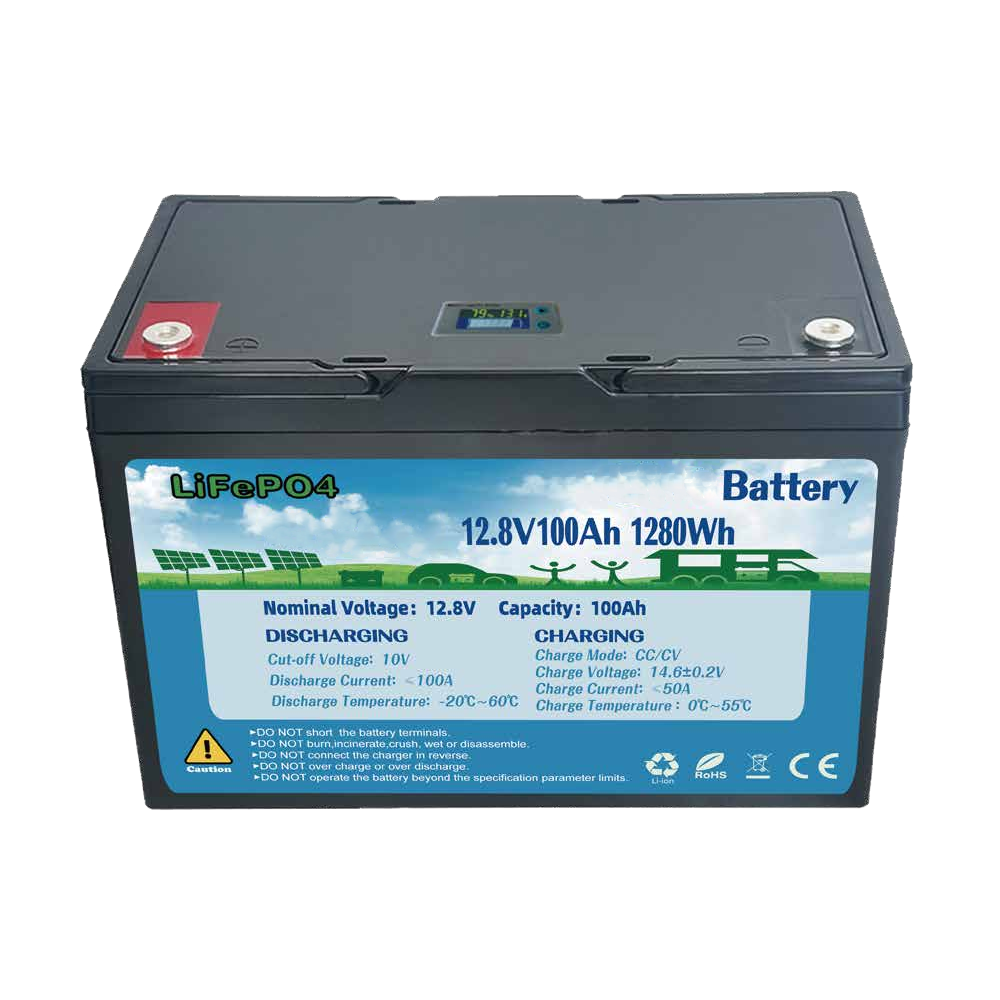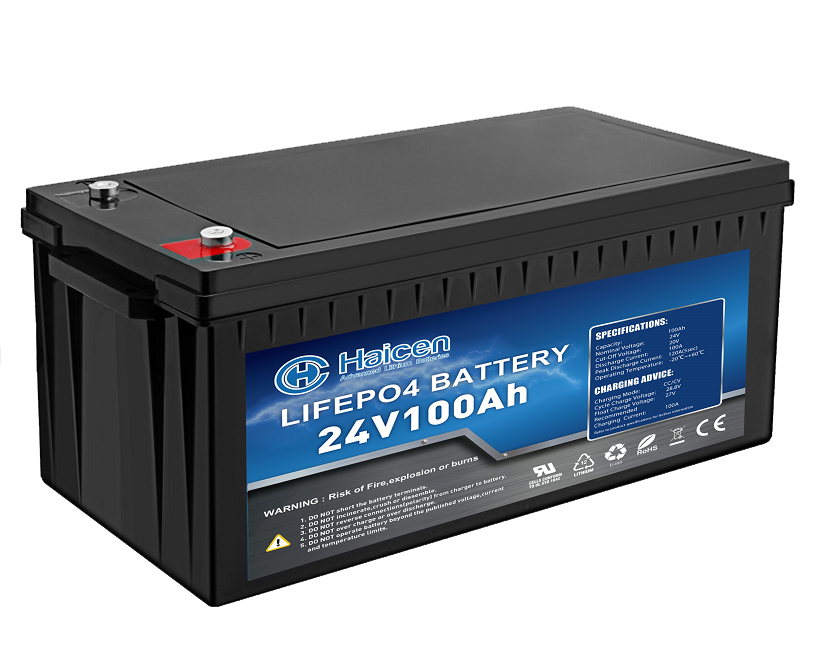Selecting the right lifepo4 battery is pivotal for the efficiency, longevity, and success of any energy system. Batteries serve as the cornerstone of power storage, and their voltage and capacity ratings define their suitability for specific applications. This guide provides an in-depth comparison of 12V 100Ah and 24V 100Ah lifepo4 batteries, helping you determine which is best suited to your needs.
Voltage Explained:Voltage is the force that drives electrical current through a circuit.
In practical terms:
12V Lifepo4 Batteries: Deliver lower voltage, ideal for smaller or standard systems.
24V Lifepo4 Batteries: Offer higher voltage, which reduces current demand, improving system efficiency.
Ampere-hour (Ah) measures lifepo4 battery energy capacity over time. For instance, the 100Ah lifepo4 battery can deliver a current of 1 ampere for 100 hours or 10 amperes for 10 hours. This rating directly impacts the runtime of connected devices.
Energy in watt-hours (Wh) is calculated as: Energy (Wh)=Voltage (V)×Capacity (Ah) ext{Energy (Wh)} = ext{Voltage (V)} imes ext{Capacity (Ah)}Energy (Wh)=Voltage (V)×Capacity (Ah)
12V 100Ah Lifepo4 Battery: 1,200 Wh
24V 100Ah Lifepo4 Battery: 2,400 Wh
This difference is a key consideration when comparing the two lifepo4 batteries types.

Key Characteristics
Voltage: 12V
Capacity: 100Ah
Energy Storage: 1,200 Wh
Portability: Compact and lightweight, often easier to transport and install.
Common Applications
Recreational Vehicles (RVs): Ideal for powering lights, fans, and small appliances.
Marine Applications: Used in trolling motors, fish finders, and boat lighting.
Solar Storage: Efficient for small residential solar installations.
Backup Systems: Reliable for powering routers, medical devices, and security systems during outages.
Advantages
Compatibility with most standard systems.
Affordable and readily available.
Easy installation and maintenance.

Key Characteristics
Voltage: 24V
Capacity: 100Ah
Energy Storage: 2,400 Wh
Higher Energy Density: Enables longer runtimes and better performance in high-demand scenarios.
Common Applications
High-Demand Solar Systems: Suitable for larger off-grid systems requiring higher efficiency.
Electric Vehicles (EVs): Powers electric motors and energy-dense systems.
Industrial Use: Powers heavy equipment like forklifts and advanced inverters.
Telecom and Data Centers: Ensures reliable backup power for critical operations.
Advantages
Lower current demand reduces energy loss and heat generation.
Fewer parallel connections simplify system design.
Improved long-term efficiency for high-power applications.
1. Energy Capacity
12V Lifepo4 Batteries: Store 1,200 Wh, sufficient for small to medium loads.
24V Lifepo4 Batteries: Store 2,400 Wh, ideal for energy-intensive systems.
2. Efficiency and Current Flow
Voltage impacts the current drawn for a given power requirement. Higher voltage means lower current, reducing resistance and energy loss:
12V Systems: Higher current increases wiring thickness and heat production.
24V Systems: Lower current minimizes losses and allows for thinner, cost-effective wiring.
3. Application Suitability
12V Lifepo4 Batteries: Ideal for small to medium-scale systems requiring portability.
24V Lifepo4 Batteries: Preferred for industrial, solar, and large-scale setups where efficiency and power are critical.
4. System Design Complexity
12V Systems: Simple design, easier to integrate with standard equipment.
24V Systems: Require specialized inverters, charge controllers, and other components, which may increase upfront costs.
5. Cost Considerations
12V Lifepo4 Batteries: Lower initial costs, suitable for budget-conscious projects.
24V Lifepo4 Batteries: Higher initial investment but lower operational costs for large systems.
1. Energy Needs
Calculate the total energy required for your system. For smaller setups like RVs or small solar installations, 12V lifepo4 batteries are sufficient. For high-demand applications, 24V lifepo4 batteries provide better efficiency.
2. Space and Portability
If installation space is limited or mobility is a priority, opt for 12V lifepo4 batteries. However, for permanent installations with high energy demands, 24V lifepo4 batteries offer superior performance.
3. Long-Term Efficiency
Evaluate the energy loss due to resistance. While 12V systems are cost-effective initially, 24V systems offer better efficiency in the long run, especially for large-scale use.
4. Equipment Compatibility
Ensure your inverter, charge controller, and other components are compatible with the selected Lifepo4 Battery voltage.
Parallel vs. Series Connections
The ability to connect batteries in series or parallel offers flexibility in system design:
12V Lifepo4 Batteries in Parallel: Increases capacity but not voltage.
24V Lifepo4 Batteries in Series: Increases both capacity and voltage, optimizing efficiency.
The decision between a 12V 100Ah and a 24V 100Ah lifepo4 batteries depends on your specific needs:
Choose 12V lifepo4 battery for portable, budget-friendly systems with low to moderate energy demands.
Opt for 24V lifepo4 battery for high-efficiency, high-demand systems where long-term performance is paramount.
By understanding the differences and aligning them with your energy requirements, you can maximize efficiency, cost savings, and system reliability. Whether you're upgrading a solar setup, designing an off-grid system, or selecting batteries for industrial use, informed decisions ensure optimal performance and value.
Next:Powering Up Remote Off-Grid Job Sites With Lithium Batteries
Previous:Comprehensive Guide to 12V Batteries
Contact Person: Miss. Elsa Liu
| WhatsApp : | +8617763274209 |
|---|---|
| Skype : | +8617763274209 |
| WeChat : | 17763274209 |
| Email : | Elsa@lifepo4-battery.com |